Your Guide to Construction, Renovation, and Zoning Laws in New Jersey

Before buying any property in New Jersey, conduct due diligence by thoroughly researching all the details and the area. The state of New Jersey has many property-related regulations regarding construction, renovation, and zoning that could affect your plans. New Jersey has 3,310,275 total housing units. This includes both owner-occupied and rental properties. Of these, 1,794,967 are single-family detached homes. New Jersey also has 391,428 vacant housing units.
Property-related laws fall into two general categories: state-level and local (town/city/county/municipality). Each state divides property law responsibilities between these two entities; some laws fall to the state and others to local government. Under each main category, there are many different rules and regulations to review.
State Level (Regulations & Codes)

New Jersey's State Uniform Construction Code (UCC) drives its building regulations. The code was established by the Department of Community Affairs (DCA), and it dictates the standards for construction and administration across the state. The UCC includes many subcodes, including those for building, plumbing, fire protection, and more. Additionally, New Jersey adopts model building codes like the International Building Code (IBC) and the International Residential Code (IRC). While the UCC provides a statewide framework, municipalities can adopt local rules that are more restrictive than the state code.
Some of the finer details of New Jersey's state-level building codes include:
-
Statewide UCC: The UCC is a statewide code, meaning it applies to all municipalities in New Jersey.
-
DCA Authority: The Commissioner of the DCA is responsible for adopting and enforcing the UCC.
-
Local Enforcement: Municipalities must adopt and enforce the UCC.
-
Building Permits: Generally, building permits are required for most construction projects, including new buildings, additions, and alterations to existing structures.
-
Inspections: Inspections are conducted throughout the construction process to ensure compliance with the codes.
-
Certificates of Occupancy: A certificate of occupancy is issued upon completion of a project to verify that it meets all requirements.
-
Energy Conservation: New Jersey has specific energy conservation requirements, often incorporating the International Energy Conservation Code (IECC).
-
Flood Hazard Areas: Coastal areas are subject to additional regulations, particularly regarding elevation requirements and flood-resistant construction.
-
Accessibility: The Barrier Free Subcode ensures buildings are accessible to people with disabilities.
The UCC includes various subcodes addressing specific areas of construction, such as:
- Rehabilitation Subcode - for existing buildings.
- Barrier-Free Subcode - for accessibility.
- Asbestos Hazard Abatement Subcode - for asbestos removal.
- Radon Hazard Subcode - for radon mitigation.
- Elevator Safety Subcode - for elevator installations and maintenance.
Construction
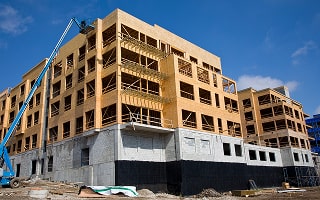
New Jersey construction laws are governed by the State Uniform Construction Code (UCC) Act, which authorizes the Commissioner of the Department of Community Affairs to adopt and enforce construction codes. This includes regulations for building, structural, electrical, HVAC, and plumbing projects. Contractors are also required to register with the Division of Consumer Affairs.
Some of the key construction laws in New Jersey include:
-
Permits: Building permits are generally required for various construction projects, including new buildings, additions, and work on electrical, HVAC, and plumbing systems.
-
Contractor Registration: The Contractor's Registration Act requires contractors to register with the New Jersey Division of Consumer Affairs,
-
Little Miller Act: This act protects subcontractors and suppliers working on public projects by requiring that the contractor obtain payment and performance bonds.
-
Noise Control: New Jersey has specific regulations regarding noise during construction, with limitations on work hours, especially in residential zones.
-
Consumer Protection: The New Jersey Consumer Fraud Act allows homeowners to seek compensation for construction defects, including design flaws, building code violations, and substandard installations.
-
Best Management Practices: Construction projects must adhere to best management practices to minimize environmental impact and comply with regulations.
-
Site Security: Construction sites must be secured to prevent unauthorized access, often requiring fences and other measures.
-
Materials Handling: New Jersey has regulations regarding the proper handling and disposal of construction materials and debris.
-
Local Ordinances: In addition to state regulations, municipalities may have their own specific construction codes and ordinances.
-
Emergency Work: For emergencies, contractors can get exemptions for work hours and other regulations to perform work that requires immediate attention.
Commercial Structures
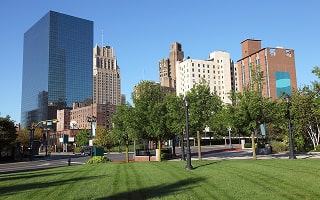
New Jersey commercial structure laws primarily revolve around the State Uniform Construction Code (UCC) and local zoning rules. The UCC, administered by the Department of Community Affairs, sets statewide standards for construction, while zoning regulations dictate how land can be used in specific areas.
Some highlights of the commercial construction laws in New Jersey include:
- Building Permits: Commercial construction or alterations, including new buildings, additions, and significant changes like structural work, HVAC, electrical, plumbing, and fire safety systems, require a building permit.
- Zoning Regulations: Zoning laws dictate how the land can be used within municipalities, which drives commercial development. Some of the ways are through setbacks, design guidelines, height and size restrictions, limits on building dimensions, parking requirements (number of spaces needed), signage (rules for commercial signs), and environmental protections, along with floodplain designations and noise limits.
- Construction Regulations: Developers must adhere to specific construction standards, which can vary by municipality and type of construction.
- Certificate of Occupancy: Before a commercial building can be occupied or used, the contractor or owner must obtain a certificate of occupancy.
- Commercial Tenant Rights: Commercial tenants have certain rights, such as quiet enjoyment, habitable premises, and protection against discrimination.
- Commercial to Residential Conversion: Converting commercial property to residential use requires obtaining necessary permits and approvals from local authorities based on detailed plans.
- Variances: Zoning variances may be needed to address exceptional situations or hardships related to building placement, size, or other zoning restrictions.
- Contractor Licensing: While not state-mandated, commercial contractors may need to be licensed by the city or county where they work.
- Construction Defects: Owners can seek compensation for defects or deviations from construction contracts, including design flaws, code violations, or substandard installations.
- Shore Protection Structures: Specific New Jersey regulations apply to commercial facilities near shorelines, including setbacks from shore protection structures.
Residential Structures
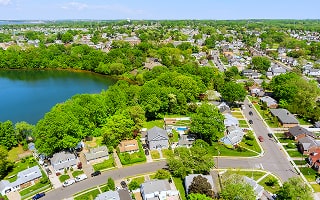
Residential construction laws in New Jersey are governed by the Uniform Construction Code (NJAC 5:23). This code is based on the 2021 International Residential Code (IRC), and other related codes like the International Building Code (IBC) and the International Fire Code (IFC).
Some of the key aspects of New Jersey's residential code include:
- Uniform Construction Code (NJAC 5:23) and International Residential Code (IRC): The NJAC 5:23 is the overarching building code for the state, and the IRC provides specific standards for residential buildings, covering everything from structural elements to electrical and plumbing.
- Building Permits: New Jersey building permits are generally required for any new construction, additions, or significant renovations, including electrical, HVAC, and plumbing work.
- Residential Structural Integrity Law: This law mandates structural inspections for covered buildings, with deadlines based on the Certificate of Occupancy issuance.
- Noise Control: New Jersey has specific regulations regarding noise from construction activities, particularly in residential zones. Generally, work is restricted during certain hours on weekdays, weekends, and holidays.
- Consumer Protection: The New Jersey Consumer Fraud Act provides homeowners with recourse for defects, deviations from contracts, and substandard work.
- Homeowner Responsibilities: Homeowners may be able to perform particular work on their primary residence, but some work requires a licensed contractor and building permits.
- Contractor Registration: Contractors must register with the New Jersey Division of Consumer Affairs.
- Subcontractor Protection: New Jersey has the Little Miller Act, which protects subcontractors and suppliers on public works projects.
- Local Noise Ordinances: Local municipalities and counties have their own noise restrictions. For example, Maplewood, NJ, has a noise ordinance that limits construction hours.
- Violations: Violations of construction laws can result in fines and other penalties. It's crucial to consult with local building departments and legal professionals for specific guidance on residential construction projects.
Safety Standards

New Jersey construction safety standards are primarily governed by the New Jersey State Uniform Construction Code (UCC) and the New Jersey Construction Safety Act, which align with federal OSHA regulations. These standards ensure a safe working environment by addressing hazards like falls, electrical issues, and the safe use of equipment. Employers and contractors are obligated to provide safe working conditions, proper training, and necessary safety equipment.
Some of the most prominent aspects of the New Jersey safety standards are:
- OSHA Compliance: New Jersey adheres to the OSHA (Occupational Safety and Health Administration) regulations, which set the national standards for workplace safety, particularly in construction.
- Construction Safety Act: This act specifically outlines obligations for employers and contractors to maintain safe work sites, including providing proper training and equipment.
- Specific Hazard Regulations: OSHA's construction standards, found in 29 CFR 1926, cover various hazards like falls, electrical work, and equipment safety.
- Hazard Communication: Employers are required to have a hazard communication program and provide training on handling hazardous chemicals.
- Site Safety: Contractors are responsible for maintaining a clean and safe work site, removing debris, and promptly reporting any hazards.
- Personal Protective Equipment (PPE): Workers must use appropriate PPE, including safety helmets, shoes, goggles, and harnesses, depending on the task and potential hazards.
- Training and Induction: Workers should receive proper training and site inductions before starting work.
- Reporting Defects: Workers must report any defects or near misses promptly to ensure they are addressed.
- Welfare Facilities: Employers are expected to provide adequate welfare facilities, including drinking water, sanitation, and changing areas.
- State Plan: New Jersey has an OSHA-approved State Plan for safety, meaning it covers most private and public sector workers.
- Violations: Failure to comply with safety standards can result in penalties and legal consequences, including potential lawsuits for injuries or damages resulting from negligence.
Building Codes
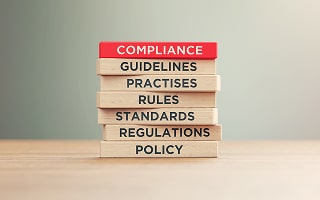
New Jersey uses a wide variety of building codes to ensure structural integrity, safety, and quality of workmanship. These codes stem from the 2021 International Building Code. Some of the building codes used in New Jersey include:
- 2021 International Building Code (IBC) New Jersey Edition
- Building Subcode
- 2021 International Energy Conservation Code
- 2021 International Fuel Gas Code
- 2021 International Swimming Pool and Spa Code
- 2021 International Residential Code (IRC) New Jersey Edition
- 2021 International Mechanical Code
- 2021 International Fire Code
- 2015 International Property Maintenance Code
Asbestos Laws
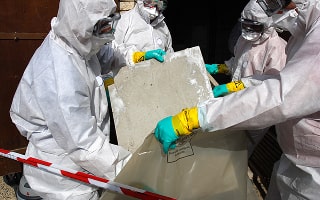
In New Jersey, construction projects involving asbestos materials are subject to strict regulations to protect workers and the public. Contractors must be licensed and their employees certified, and asbestos surveys are often required before demolition or renovation. If asbestos is disturbed, specific abatement procedures must be followed.
Some of the key details about asbestos laws include:
- Contractor Licensing: Any contractor involved in asbestos abatement in New Jersey must possess a license from the New Jersey Department of Labor and Workforce Development (DOLWD).
- Employee Certification: Abatement workers and supervisors must also be certified by the DOLWD, holding either a worker or supervisor permit.
- Asbestos Surveys: Asbestos surveys, conducted by licensed professionals, are generally required before demolition, renovation, or maintenance on building systems where asbestos-containing materials might be present. Surveys help identify the presence and location of asbestos-containing materials (ACMs) to ensure proper handling during construction activities. Only licensed asbestos consultants or accredited asbestos building surveyors working under their direction can perform these surveys. The survey report must be maintained on-site during renovation, even if no asbestos is disturbed, and must conform to DEP requirements.
- No Disturbance: If asbestos is present but not disturbed, no formal notification is needed.
- Removal of Flooring: Contractors must notify the DBPR three days before removing any resilient flooring containing asbestos.
- Abatement Procedures: If ACMs are encountered and disturbed, specific abatement procedures must be followed. This includes containment, removal, and disposal.
- Worker Protection: Employers must ensure that workers are not exposed to airborne asbestos concentrations exceeding permissible exposure limits (PELs).
- OSHA Standards: OSHA sets standards for worker protection during asbestos-related work, including permissible exposure limits and required training and equipment. New Jersey adheres to OSHA standards.
Homes built before the 1980s in New Jersey are more likely to contain asbestos, especially in materials like popcorn ceilings, vinyl flooring, and insulation.
Contractor Licensing Laws
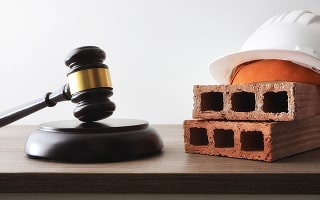
In New Jersey, general contractors do not require a state-issued license, but they must register with the New Jersey Division of Consumer Affairs as home improvement contractors. Anyone involved in the construction, improvement, or repair of homes must register. Additionally, specific trades like plumbing and electrical work require separate licenses issued by the state.
Some key requirements for contractors working in New Jersey are:
- Registration: Home improvement contractors must register with the New Jersey Division of Consumer Affairs. Registration involves providing business licenses, proof of bonding, and insurance.
- Insurance: Renovation contractors must carry general liability insurance with at least $500,000 per occurrence.
- Written Contracts: For any home improvement contract exceeding $500, a written agreement is required, signed by both the contractor and the homeowner. This contract should include the contractor's registration number, a copy of their insurance certificate, the total contract price, a description of the work, and start/end dates.
- Specific Trades: Certain trades, like plumbing and electrical work, do require separate state-issued licenses.
Insurance & Bonds
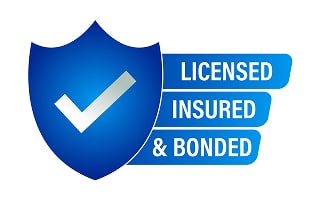
To register as a general contractor in New Jersey, you must have general liability insurance of at least $500,000 per occurrence. This insurance helps to protect your business from expenses related to property damage and injuries to people (not you and your employees). Some municipalities require 10% of the construction costs or $1,000,000, whichever is greater. Contractors with employees will also need workers' compensation insurance, and anyone who uses automobiles in their work must have vehicle liability insurance. Some contractors will also need excess/umbrella liability, crime, or employers' liability.
New Jersey also requires surety bonds from contractors. Work exceeding $120,000 or annual services of $750,000 or more will require a bond of $50,000. Contracts between $10,000 and $120,000 or annual services between $150,000 and $750,000 will require a $25,000 bond. Contracts under $10,000 or annual services totaling less than $150,000 will only need a surety bond of $10000.
Public Works Contracts/Public Bidding

In New Jersey, public works projects involve the construction, maintenance, and repair of public infrastructure and facilities, funded by government entities. These projects are governed by specific laws and regulations, including prevailing wage requirements and contractor registration, and are overseen by various state and local agencies. Public works projects can include road and bridge construction and maintenance, snow removal, stormwater management, and repairs to public buildings.
Some highlights of New Jersey's public works projects regulations include:
-
Contractor Registration: Contractors and subcontractors working on public works projects must register with the New Jersey Department of Labor and Workforce Development.
-
Prevailing Wage: Public works projects in New Jersey are subject to prevailing wage laws, meaning contractors must pay workers at least the locally prevailing wage rate for their specific trade.
-
Certified Payroll Reporting: Since August 15, 2024, contractors on public works projects must submit certified payroll records through the New Jersey Wage Hub.
-
Project Labor Agreements (PLAs): Public agencies in New Jersey are authorized to include PLAs in public works projects, which may involve agreements with specific unions.
-
State Building Service Contracts Act: This act sets prevailing wage levels for employees of contractors providing building services for state-owned or leased properties.
-
Executive Order No. 11: This executive order requires all public works projects to adhere to existing laws and regulations, especially those related to minority and women-owned businesses.
-
Electronic Procurement: State contractors can accept electronic bid security and administer electronic processes for obtaining goods and services related to the contract.
Renovations
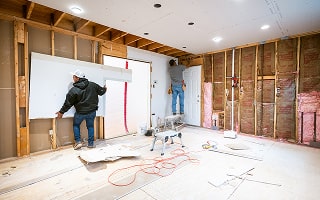
In New Jersey, when renovating a home, you generally require building permits for structural, electrical, HVAC, and plumbing work. Home improvement contractors must also be registered and may need to be bonded, particularly for larger projects or those involving financing.
Some of the critical aspects of New Jersey renovation laws are:
- Building Permits: New Jersey building permits are required for projects like adding an addition, renovating a kitchen or bathroom, or changing the layout of a room. Building permits often require inspections at various stages of the project, including initial, rough-in, and final inspections. Fees for permits vary depending on the scope and complexity of the project.
- Contractor Registration: New Jersey requires home improvement contractors to register with the Division of Consumer Affairs. Many contractors may need a compliance bond, especially when the contracts exceed a specific dollar amount or annual service volumes.
- Financed Contracts: Contractors also require a separate contractor license if they work on financed home repair contracts.
- Consumer Fraud Act: New Jersey's Consumer Fraud Act protects homeowners from defects or deviations from construction contracts, including design, code violations, and substandard work.
- No Permit Required: Minor renovations and upgrades like painting, plumbing fixture replacements, door replacements, and other cosmetic changes that do not affect the structural integrity do not generally require permits.
- Contractor Responsibilities: Contractors are responsible for obtaining necessary permits, adhering to building codes, and ensuring their work is performed safely and professionally.
Environmental Laws

New Jersey has various environmental laws regarding construction activities to protect public health and the environment, especially in overburdened communities. These laws focus on air and water quality, along with waste management.
Some key aspects of New Jersey environmental laws include:
- Freshwater Wetlands and Transition Areas: Construction, including single-family homes and additions, within or impacting freshwater wetlands, transition areas, or state open waters requires permits or waivers from the NJDEP (New Jersey Department of Environmental Protection).
- Environmental Justice (EJ) Laws: New Jersey's EJ laws are designed to reduce pollution in overburdened communities by evaluating the cumulative environmental and public health impacts of certain facilities on these communities.
- Air Pollution Control: The Air Pollution Control Act (1954), along with the Federal Clean Air Act, regulates emissions from construction sites and other sources to limit harmful substances in the air.
- Water Quality and Waste Management: Regulations ensure construction activities don't pollute water bodies and properly manage construction waste, including hazardous materials.
- Environmental Rights Act (ERA): This act allows citizens to take legal action against entities violating environmental laws.
- Spill Compensation and Control Act: This act regulates the discharge of hazardous substances and mandates cleanup for spills.
- Climate Change Considerations: Government agencies must also consider the potential impacts of climate change on construction projects and land use, ensuring projects are resilient to climate change impacts.
- Overburdened Communities: New Jersey defines overburdened communities as those with high percentages of low-income households and minority populations, often facing disproportionate environmental and public health stressors.
- Permit Denials: According to the New Jersey Department of Environmental Protection (NJDEP), "The state can deny permits for certain polluting facilities in overburdened communities if an EJ analysis determines the facility will have a disproportionately negative impact."
- Supplemental Environmental Projects (SEPs): In some cases, projects that benefit overburdened communities may be prioritized or required as part of a settlement or permit.
- Compliance: Construction projects must be carefully planned to comply with all relevant environmental regulations. Obtain necessary permits and approvals before starting construction activities. Contractors must conduct environmental assessments to identify potential impacts and ensure compliance with regulations. Sometimes that includes consulting with the NJDEP and other relevant agencies to understand requirements and address any potential issues.
Solar Regulations
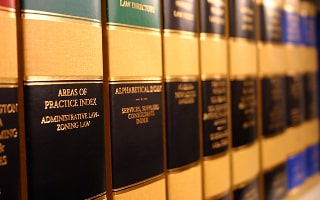
New Jersey has a strong focus on solar energy, with regulations and incentives aimed at moving towards renewable energy sources. The state's Renewable Portfolio Standard (RPS) requires 35% of energy sold to come from qualifying sources by 2025, with a focus on solar. The state's Solar Act of 2021 directs the Board of Public Utilities (BPU) to incentivize up to 3,750 MW of solar generation by 2026. New Jersey has a target of 50% by 2030. The state also has specific regulations for farm-based solar facilities and aims for 100% clean energy by 2035
Some major highlights of solar regulations in New Jersey include:
-
Solar-Ready Zones: New construction projects, particularly one and two-family dwellings and townhouses, may be required to have a designated "solar-ready zone" on the roof. This area is reserved for future solar panel installation and must meet specific size and setback requirements.
-
Farm-Based Solar Facilities: New Jersey has specific laws regarding the construction, installation, operation, and maintenance of solar energy facilities on farms.
-
Oversizing Solar Panels: In some cases, solar panel systems can be oversized (up to 33% more than the inverter's capacity) to maximize energy production, especially when combined with battery storage.
-
Permitting: New Jersey has a permitting process for solar installations, which may vary depending on the size and location of the project.
-
Environmental Compliance: Solar projects in New Jersey must comply with environmental regulations, including those related to land use and pollution control.
-
NJ Legislature: New laws have been passed that incentivize solar energy growth and streamline the permitting process.
Gas/Oil

New Jersey gas and oil regulations related to construction primarily focus on safety and environmental protection, particularly concerning underground storage tanks (USTs) and fuel gas/oil piping. These regulations are intertwined with the Uniform Construction Code (UCC) and require permits for various activities related to gas and oil systems.
Some of the key aspects of gas/oil in construction in New Jersey include:
-
Underground Storage Tanks (USTs): A permit is required for the installation or substantial modification of UST systems. This includes both new and existing tanks. The NJ Department of Environmental Protection (DEP) oversees UST regulations and requires registration of UST systems.
-
Fuel Gas and Oil Piping: New construction generally prohibits fuel gas and oil piping, with exceptions for emergency electrical generation, commercial kitchens, commercial laundries, and approved industrial processes. Existing fuel gas and oil piping in one- and two-family dwellings may be extended under specific conditions, such as reduced overall gas use or for creating additional housing units.
-
NJ Uniform Construction Code (UCC): The UCC dictates construction permits and inspections, including those related to gas and oil systems. The UCC mandates that plans and specifications be released before work can begin, and permits must be obtained from the municipality.
-
Inspections: The Mechanical Inspection Bureau of Boiler and Pressure Vessel Compliance (BB&PVC) is responsible for inspecting boilers and pressure vessels. Owners must notify the BB&PVC within 30 days of installing new or replacement equipment.
-
Prevailing Wage: The New Jersey State Prevailing Wage Act mandates that contractors and subcontractors involved in public works projects register and pay prevailing wages, which may include gas and oil-related construction.
-
Interstate Pipelines: The Federal Energy Regulatory Commission (FERC) regulates interstate natural gas pipelines, but New Jersey retains some oversight through the Clean Water Act.
-
Call Before You Dig: New Jersey law requires marking underground public utility lines before digging to prevent accidental damage during construction.
Electricity

In New Jersey, electrical work during construction requires permits and adherence to the State Uniform Construction Code (UCC). The UCC, authorized by the Commissioner of the Department of Community Affairs, governs construction codes and their administration statewide. Generally, electrical permits are needed for any electrical work, including alterations or additions, with some exceptions, such as minor repairs and testing systems. Homeowners can perform electrical work themselves on single-family homes if they are knowledgeable, but commercial properties and multiple-family dwellings require licensed contractors. New Jersey is also committed to 100% clean energy by 2035 and has an energy storage target.
Other details of electricity laws in New Jersey include:
-
Permits and Regulations: The Uniform Construction Code (UCC), enacted in 1975, sets the guidelines for construction laws, including electrical work and permits. An electrical permit is generally required for any new electrical installations, alterations, or additions. Licensed electrical contractors are required for all electrical work on commercial properties and multiple-family dwellings. Minor repairs (like replacing a light bulb or plugging in a portable appliance), radio/TV transmission equipment, and temporary testing systems are typically exempt from requiring a permit.
-
Clean Energy Goals: New Jersey has a goal of transitioning to 100% clean energy by 2035. New Jersey's RPS mandates that a certain percentage of electricity sold in the state must come from renewable sources. New Jersey also has an energy storage target of 2,000 MW by 2030.
-
Changes in Occupancy: Electrical systems in buildings undergoing changes in use or occupancy must comply with the new use's code requirements.
-
Moved Buildings: Electrical systems in buildings moved into or within the jurisdiction must also comply with the code for new installations.
-
Dangerous or Unsafe Conditions: If the administrative authority determines that electrical systems are dangerous, unsafe, or a threat to life, health, or property, they can take action, including suspending or revoking permits.
Government Housing Programs
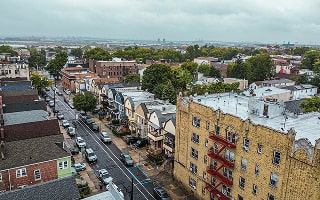
New Jersey has a few government-funded housing programs to assist low-income families, individuals, and those experiencing homelessness. These programs include rental assistance, Section 8 vouchers, and homelessness prevention initiatives. The state also provides resources for energy assistance, weatherization, and lead remediation.
Some of the government housing programs offered in New Jersey include:
- State Rental Assistance Program (SRAP): The SRAP is a state-funded program providing subsidies to very low-income residents for decent, safe, and sanitary housing.
- Housing Choice Voucher Program (Section 8): A federally funded program (managed by HUD) that helps low-income families, seniors, and people with disabilities afford housing in New Jersey.
- Emergency Housing Vouchers: This voucher program provides rental assistance to those facing homelessness or housing instability.
- Family Self-Sufficiency Program: A program aimed at helping families achieve self-sufficiency, often linked to Section 8 vouchers.
- Supportive Housing Connection (SHC): The SHC connects individuals with housing resources and helps establish leases.
- Public Housing: The New Jersey Housing Authority owns and manages public housing units and administers other housing programs.
- Universal Service Fund/Home Energy Assistance Program (USFHEA), Weatherization Assistance Program (WAP), and Lead Remediation and Abatement Program (LRAP): These programs provide assistance with energy costs, home weatherization, and lead remediation.
- NJ 2-1-1- Partnership: NJ 211 provides resources and connections to housing and support services.
Property Tax Credits and Incentives
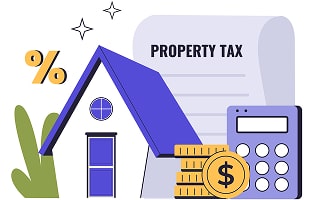
Property taxes throughout the U.S. are rising, and some Americans are struggling to pay them. The state of New Jersey offers several ways to help property owners pay their taxes. The state provides the options below:
- Property Tax Deduction/Credit - Eligible homeowners or renters who pay taxes on their primary residence in New Jersey can claim a refundable income tax credit. You can deduct the amount of property tax you paid or $15,000, whichever is less.
- Seniors and Disabled Adults: $250 deduction.
- Veterans: $250 deduction.
- Disabled Veterans: 100% property tax exemption.
- Active Military Service Property Tax Deferment
- Historic Site Property Tax Exemption
- Non-profit Organization Property Tax Exemption
- Renewable Energy System Property Tax Exemption
Local Level (Permits and Regulations)
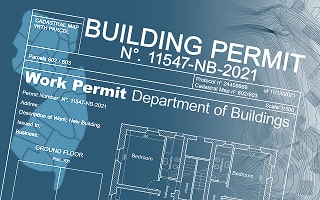
The state of New Jersey sets the building code standards with safe minimums, and each county or city adopts these codes and can strengthen them if they choose. The job of local government is to enforce the building codes to keep people safe and ensure the structural integrity of buildings. They do this primarily through the use of building permits and inspections. They also use zoning to control how land is used and how densely populated areas can be.
Building permits are generally required for most construction, structural work, electrical, HVAC, and plumbing projects. Some exceptions are minor work, such as interior and exterior painting, interior finish replacements, or replacing window glass. All home improvement contractors must be registered with the New Jersey Division of Consumer Affairs.
Building-Friendly Areas of New Jersey
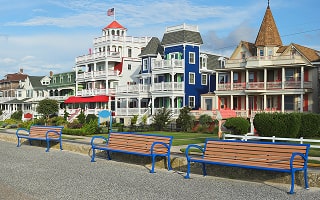
Several New Jersey towns may be easier to build in, particularly those where the local government is focused on affordable housing or has less stringent zoning regulations. Camden, Gloucester City, Vineland, and Atlantic City are some cities that have more affordable housing options. Additionally, some municipalities, like Atlantic County, that have a history of supporting development, might be more accommodating to new construction.
Some cities, such as Trenton, Plainfield, Woodbury, Surf City, Gloucester City, Cape May, and Union City, are much more open to unique housing options like tiny homes.
Where to Obtain New Jersey Building Permits
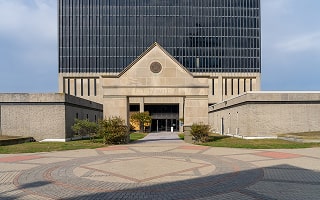
To obtain a building permit in New Jersey, you must apply to your local municipal Building Department. Permits are required for any construction, alteration, or repair work to ensure that you comply with building codes and zoning regulations.
The general process for obtaining a New Jersey building permit is as follows:
- Research Local Regulations: Contact your local municipal building department to understand their specific requirements and procedures. You can visit in person or use the website. Many of them have digital tools you can use to apply.
- Prepare the Necessary Documents: Gather together your planning documents, drawings, specifications, and money to pay the fee.
- Submit the Application: Submit the completed application, along with all required documentation, to the local building department. Again, you can do this in person or upload it to the building department's website. Remember to pay the fee when applying.
- Review Process: The application will be reviewed by the relevant official (Construction Official, Subcode Officials, Local Building Inspector, etc.).
- Receive the Permit and Begin Building: Receive your permit, and you can now begin the project.
- Schedule an Inspection: Throughout the project, inspections will be conducted by the municipality to ensure compliance.
Some links to other building departments in New Jersey include:
- Borough of Highlands Building Permits
- Cherry Hill Township Permits
- City of Jersey City Online Permitting and Licensing
- City of Rahway Division of Building
- Newton Permits
- Township of Randolph Construction Permits
- Township of Warren Building Permits
- Union Township Building Department
- Upper Saddle River Permits
- Woodbridge Township Building Permits
- Wyckoff Building Permits
You can also find building permit application forms and resources on the New Jersey Department of Community Affairs (DCA) website.
During the permitting process, the building inspector must inspect the work being performed. They may do this before, during, and after the project to ensure the work complies with all local building codes to keep people safe. Depending on the city or county's rules, you may schedule your inspections through the online portal, by phone, or by email.
You can verify contractor licensing through the New Jersey Division of Consumer Affairs website.
Zoning Laws
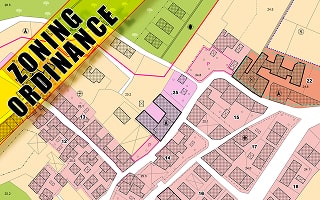
New Jersey zoning laws dictate how land and buildings can be used within each municipality. Every town in New Jersey is required to have a comprehensive master plan and land use ordinance, which includes zoning regulations for residential, commercial, industrial, open space, public use, and agricultural areas. These regulations cover aspects like lot size, building height, and setback distances (how close a building can be to a property line).
New Jersey municipalities have the power to adopt their own zoning ordinances within their boundaries.
The Municipal Land Use Law (N.J.S.A. 40:55D-1 et seq.) governs planning, zoning, subdivision, and site plan powers.
Zoning violations occur when property is used in a way that is not permitted by the zoning ordinance.
New Jersey generally prohibits zoning laws that benefit or harm a particular property and are inconsistent with the master plan.
Some of the zoning designations used for land throughout New Jersey include:
-
Residential: Divides areas into single-family, multi-family, apartments, and mixed-use zones.
-
Commercial: Designates areas for various business types, including retail, offices, and other establishments.
-
Industrial: Focuses on manufacturing, warehousing, distribution centers, and other industrial activities.
-
Agricultural: Limits development density and may restrict non-farm uses.
-
Open Space: Protects natural areas and encourages recreational uses.
-
Public Use: Designates areas for government buildings, schools, and other public facilities.
New Jersey Specific Zoning Examples:
- R-1 (Single-Family Residential): Permits single-family homes on individual lots.
- R-2 (Multiple Residence): Allows for multi-family dwellings like townhouses or apartments.
- C-1 (Neighborhood Commercial): Permits small-scale, local businesses.
- C-2 (General Business and Light Manufacturing): Allows for a wider range of commercial and light industrial activities.
Related Links and Enforcement Offices
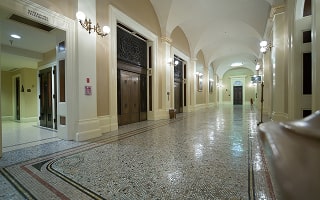
When it comes to New Jersey construction, renovation, building, and housing regulations, many government departments and agencies standardize, regulate, and enforce building rules. There is some overlap with their duties, but most in New Jersey are on the local level. The state agencies tend to set broad minimum standards, and then the cities, towns, and counties customize and adopt from there.
The links below provide detailed information on the state's construction, zoning, renovation, and housing rules.
Other Helpful Links
- New Jersey Department of Community Affairs
- International Building Code (IBC)
- International Residential Code (IRC)
- Contractor's Registration Act
- New Jersey Consumer Fraud Act
- New Jersey Uniform Construction Code
- New Jersey Department of Labor and Workforce Development
- New Jersey Department of Environmental Protection
- The Air Pollution Control Act (1954)
- New Jersey Board of Public Utilities
- New Jersey Renewable Portfolio Standard (RPS)